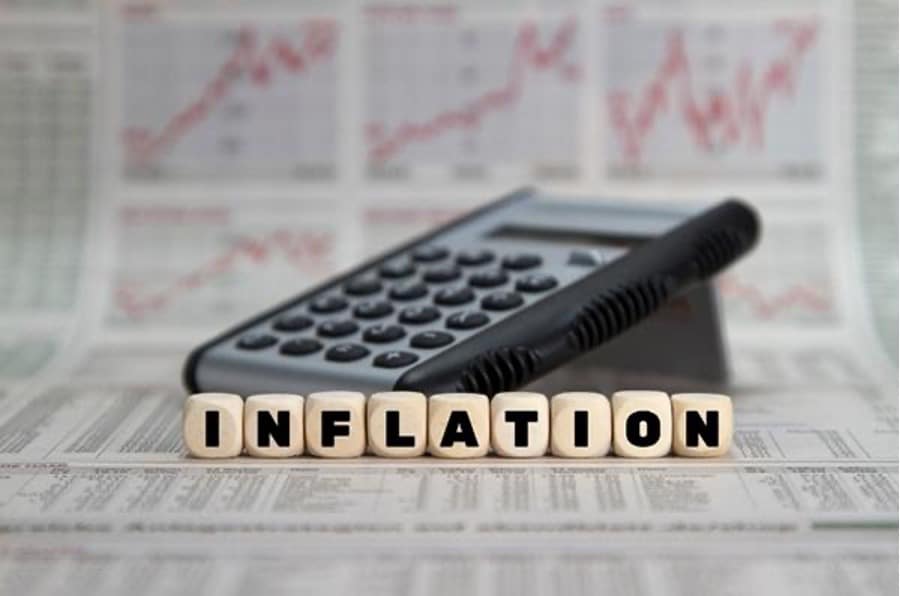By Kevin Boutwell, CFP®
You may have heard scary headlines about record-high inflation, with consumer prices jumping 9% in June 2022. (1) Whether it’s caused by the actions of the Federal Reserve, Russia, or just due to COVID-induced supply chain issues is up for debate. What cannot be denied is that inflation can do some serious damage to your retirement savings. Here are the three biggest ways inflation can affect your retirement and how you can help protect your money.
1. Cash Holdings
Holding on to cash causes you to lose purchasing power with inflation—no matter if you’re keeping your money stuffed in your mattress or saving it at a bank.
Now, you may be thinking, “But I earn interest on the money I keep at my bank. Doesn’t that count for something?” Yes, it does help a little. But considering the average savings account interest rate is 0.06% (2) and the average rate of inflation is 2%, (3) your purchasing power is still going down every year.
Even if you open a high-yield savings account earning 1% a year, your money is still eroding over time (albeit at a slower rate). That’s why investing is so important. It’s one of the only ways to build long-term wealth that outpaces inflation.
That said, it’s important to note that cash does have its place in your financial picture. It can serve as an emergency fund, give you a temporary spot to store money you’ll use in the short term, and can even serve as an income source in retirement when your portfolio is down. We’re not saying you shouldn’t have cash, we’re just saying it likely won’t keep up with inflation.
2. Household Expenses
Inflation also erodes your purchasing power over time. Even if you vow to only buy the same items for the rest of your life, you’ll slowly need more money to buy those items as time goes on.
Here’s an example to show what I mean.
Let’s say your current household expenses are $10,000 a month. In 20 years you’ll likely need around $14,900 to cover those same expenses, assuming a 2% annual inflation rate. In 30 years, you’ll need around $18,100.
As you plan for expenses in retirement, don’t forget about inflation. The price of goods and services will rise. Not only do you need to save enough to cover today’s expenses, but you also need enough to cover your future, inflated expenses.
3. Portfolio
Similar to the other items on our list, inflation can also chip away at your portfolio. Here’s how it affects your fixed-income investments and your stock investments. (4)
- Fixed-income investments. Bonds, treasuries, and CDs provide a stable income stream, but the purchasing power of your interest payments begin to decline as inflation rises. (This is similar to what happens with your cash holdings, as we mentioned earlier.) While bonds can provide some stability to your income, you don’t want to solely rely on them in retirement.
- Stock investments. The average return of the stock market has been around 10% over the past century (5)—more than enough to cover the average rate of inflation and then some. Because of this, ETFs and mutual funds made up of stock holdings give you the best chance of outpacing inflation and building long-term wealth.
As you approach retirement, you want your portfolio to be conservative enough to protect your wealth as you begin living off it, but aggressive enough to protect you from inflation. Striking this delicate balance is often something best achieved with the help of an experienced financial advisor.
How We Help
There are so many variables to account for in retirement, inflation being at the top of the list. Have you implemented any strategies into your retirement plan for how you’ll combat inflation in retirement? If not, now is the time to get started. At Veracity Capital, we’d love to help you feel more confident in your future—whether you need help creating a retirement plan, managing your investments, or setting new goals. Reach out to me at 678.888.4952 or [email protected] to get started with a no-obligation get-acquainted meeting.
About Kevin
Kevin Boutwell is a wealth advisor and partner at Veracity Capital. With almost a decade of experience in the financial industry, Kevin has acquired expertise in managing equity compensation. He focuses his services on corporate executives who have complicated compensation packages and resulting tax headaches. He believes that proper financial planning drives the best investment decisions, and his customized process and strategies help his clients achieve better outcomes. Kevin prioritizes building long-term relationships and offers the perfect mix of analytical, problem-solving, and a personal touch so his clients can focus on what’s important while knowing their finances are taken care of.
Kevin is a highly decorated veteran former U.S. Navy pilot. He got his start in the financial industry at Goldman Sachs and is a CERTIFIED FINANCIAL PLANNER™ practitioner. Kevin earned his Bachelor of Science in Mechanical Engineering from the Georgia Institute of Technology and an MBA from Indiana University’s Kelley School of Business. Out of the office, you can find Kevin staying busy with his family, including his young triplet sons. He stays involved with several non-profit veteran organizations and participates in the Georgia Tech mentoring program. When he has a spare moment, he enjoys staying active with CrossFit and an occasional round of golf. To learn more about Kevin, connect with him on LinkedIn.
Advisory services offered through Veracity Capital, LLC, a registered investment advisor. Information presented is for educational purposes only and does not intend to make an offer or solicitation for the sale or purchase of any specific securities, investments, or investment strategies. Investments involve risk and, unless otherwise stated, are not guaranteed. Be sure to first consult with a qualified financial advisor and/or tax professional before implementing any strategy discussed herein. Past performance is not indicative of future performance.
______________
(1) https://www.wsj.com/articles/us-inflation-june-2022-consumer-price-index-11657664129
(2) https://www.bankrate.com/banking/savings/average-savings-interest-rates/
(3) https://www.thebalance.com/u-s-inflation-rate-history-by-year-and-forecast-3306093
(5) https://www.nerdwallet.com/article/investing/average-stock-market-return

